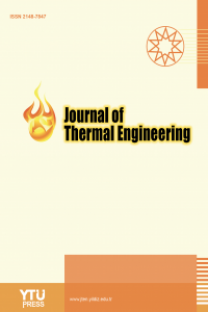A NUMERICAL STUDY OF FORCED CONVECTIVE FLOW IN MICROCHANNELS HEAT SINKS WITH PERIODIC EXPANSION-CONSTRICTION CROSS SECTION
This paper aims to study numerically
the laminar convective heat transfer of ionized water flow inside rectangular
heat sinks with periodic expansion-constriction cross-section; each heat sink
consists of parallel microchannels system with 4 mm wide and 0.1 mm deep in
constant cross-section segment.
Two-dimensional laminar numerical simulations, based on Navier-Stoks
equations and energy equation, are obtained under the same boundary conditions
for different microchannels. In this study, the heat transfer and pressure drop
inside microchannels with cross-section (cylindrical grooves and triangular
cavities) are compared with that of simple smooth microchannel at Reynolds
number ranging from 150-1500; an increase in pressure drop of 44% for all
microchannels is observed with Reynolds
number increasing. The obtained results
indicate an enhancement in Nusselt number for all microchannels at all Reynolds
number values with a maximum enhancement of 36%, these ameliorated thermal
parameters attribute to enhance the heat transfer efficiency of proposed
microchannels. Which improve the effect of periodic expansion-constriction
cross-section on the heat transfer performance for microelectromechanical
systems (MEMS) cooling phenomena.
Keywords:
Cooling Systems, Heat Transfer Enhancement, Heat Sink Microchannels, MEMS, Cross Section,
___
- [1] Berlin, A. A., & Gabriel, K. J. (1997). Distributed MEMS: New challenges for computation. IEEE Computational Science and Engineering, 4(1), 12-16.
- [2] Tuckerman, D. B., & Pease, R. F. W. (1981). High-performance heat sinking for VLSI. IEEE Electron device letters, 2(5), 126-129.
- [3] Samalam, V. K. (1989). Convective heat transfer in microchannels. Journal of Electronic Materials, 18(5), 611-617.
- [4] Peng, X. F., Peterson, G. P., & Wang, B. X. (1994). Heat transfer characteristics of water flowing through microchannels. Experimental Heat Transfer An International Journal, 7(4), 265-283.
- [5] Peng, X. F., & Peterson, G. P. (1996). Convective heat transfer and flow friction for water flow in microchannel structures. International journal of heat and mass transfer, 39(12), 2599-2608.
- [6] Li, J., & Peterson, G. P. (2005). Boiling nucleation and two-phase flow patterns in forced liquid flow in microchannels. International journal of heat and mass transfer, 48(23-24), 4797-4810.
- [7] Margot, X., Hoyas, S., Gil, A., & Patouna, S. T. A. V. R. O. U. L. A. (2012). Numerical modelling of cavitation: validation and parametric studies.Engineering Applications of Computational Fluid Mechanics, 6(1), 15-24.
- [8] Sheikholeslami, M., Vajravelu, K., & Rashidi, M. M. (2016). Forced convection heat transfer in a semi annulus under the influence of a variable magnetic field. International Journal of Heat and Mass Transfer, 92, 339-348.
- [9] Sheikholeslami, M., Rashidi, M. M., & Ganji, D. D. (2015). Effect of non-uniform magnetic field on forced convection heat transfer of Fe3O4–water nanofluid. Computer Methods in Applied Mechanics and Engineering, 294, 299-312.
- [10] Sheikholeslami, M., Rashidi, M. M., & Ganji, D. D. (2015). Effect of non-uniform magnetic field on forced convection heat transfer of Fe3O4–water nanofluid. Computer Methods in Applied Mechanics and Engineering, 294, 299-312.
- [11] Farhanieh, B., Herman, Č., & Sundén, B. (1993). Numerical and experimental analysis of laminar fluid flow and forced convection heat transfer in a grooved duct. International journal of heat and mass transfer, 36(6), 1609-1617.
- [12] Qu, W., & Mudawar, I. (2002). Analysis of three-dimensional heat transfer in micro-channel heat sinks. International Journal of heat and mass transfer, 45(19), 3973-3985.
- [13] Chai, L., Xia, G., Zhou, M., Li, J., & Qi, J. (2013). Optimum thermal design of interrupted microchannel heat sink with rectangular ribs in the transverse microchambers. Applied Thermal Engineering, 51(1-2), 880-889. [14] Weilin, Q., Mala, G. M., & Dongqing, L. (2000). Pressure-driven water flows in trapezoidal silicon microchannels. International journal of heat and mass transfer, 43(3), 353-364.
- [15] Ghaedamini, H., Lee, P. S., & Teo, C. J. (2013). Developing forced convection in converging–diverging microchannels. International Journal of Heat and Mass Transfer, 65, 491-499.
- [16] Gong, L., Kota, K., Tao, W., & Joshi, Y. (2011). Parametric numerical study of flow and heat transfer in microchannels with wavy walls. Journal of Heat Transfer, 133(5), 051702.
- [17] Zheng, Z., Fletcher, D. F., & Haynes, B. S. (2013). Laminar heat transfer simulations for periodic zigzag semicircular channels: chaotic advection and geometric effects. International Journal of Heat and Mass Transfer, 62, 391-401.
- [18] Liu, Y., Cui, J., Jiang, Y. X., & Li, W. Z. (2011). A numerical study on heat transfer performance of microchannels with different surface microstructures. Applied Thermal Engineering, 31(5), 921-931.
- [19] Xia, G., Chai, L., Zhou, M., & Wang, H. (2011). Effects of structural parameters on fluid flow and heat transfer in a microchannel with aligned fan-shaped reentrant cavities. International Journal of Thermal Sciences, 50(3), 411-419.
- [20] Xia, G., Chai, L., Wang, H., Zhou, M., & Cui, Z. (2011). Optimum thermal design of microchannel heat sink with triangular reentrant cavities. Applied Thermal Engineering, 31(6-7), 1208-1219.
- [21] Chai, L. Xia,G.D. Wang,L. Zhou, M.Z and Cui, Z.Z., Heat transfer enhancement in microchannel heat sinks with periodic expansion–constriction cross-sections, Int. J. Heat Mass Trans., 2013 62,741–751.
- [22] Gururatana, S. (2012). Numerical simulation of micro-channel heat sink with dimpled surfaces. American Journal of Applied Sciences, 9(3), 399.
- [23] Dehghan, M., Daneshipour, M., Valipour, M. S., Rafee, R., & Saedodin, S. (2015). Enhancing heat transfer in microchannel heat sinks using converging flow passages. Energy Conversion and Management, 92, 244-250.
- [24]Patankar, S.V., (1980). Numerical Heat Transfer and Fluid Flow. 1st Edn, Hemisphere Publication Corporation, Washington: ISBN: 0070487405.
- [25] Grigull, U., & Tratz, H. (1965). Thermischer einlauf in ausgebildeter laminarer rohrströmung. International Journal of Heat and Mass Transfer, 8(5), 669-678.
- Başlangıç: 2015
- Yayıncı: YILDIZ TEKNİK ÜNİVERSİTESİ
Sayıdaki Diğer Makaleler
K. DEVECİ, H. MARAL, C. B. ŞENEL, E. ALPMAN, L. KAVURMACIOĞLU, C. CAMCI
Mohamed Ammar ABBASSİ, Ridha DJEBALİ, Kamel GUEDRİ
Ahmet Selim DALKILIÇ, Ali CELEN, Pınar CELEN, Mehmet Salih CELLEK, Tolga TANER, Yakup KARAKOYUN, Somchai WONGWİSES, Aydın Hacı DONMEZ, Alican ÇEBİ
ALTERNATIVE REFRIGERANTS FOR HCFC 22—A REVIEW
